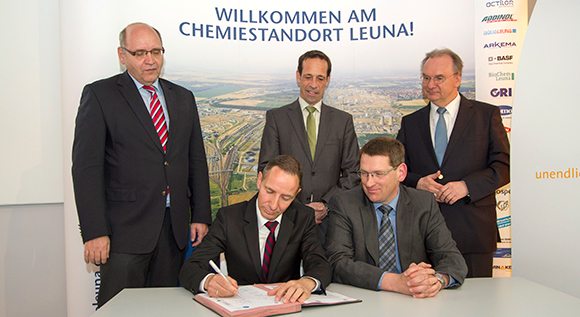Energy-efficiency networks – Working together really pays off
Working together to achieve more – this is what the Energy Efficiency Networks initiative is all about. However in this case, "more" actually means "less": using less energy than we have done in the past. Launched back in December, our joint work is now beginning to take shape.
 © InfraLeuna GmbH/ Egbert Schmidt
© InfraLeuna GmbH/ Egbert Schmidt
By 2020, primary energy consumption in Germany is to be reduced by 20% compared to 2008. This requires everyone to play their part – private households, towns and municipalities, as well as business and industry. The National Action Plan on Energy Efficiency, which was passed by the German government at the end of 2014, sets out a comprehensive strategy for improving Germany’s energy efficiency. One of the immediate measures announced in the Plan was the Energy Efficiency Networks initiative, which was launched immediately. The German government came together with 20 business associations and organisations, and based upon this cooperation, the decision was made to launch around 500 new energy efficiency networks between different firms by the end of 2020. This is to make a substantial contribution to goals in the field of energy and climate policy, saving up to 75 petajoules of primary energy and five million tonnes of greenhouse gases over the next five years.
Network of pioneers established in the town of Leuna – home to a vast chemicals industry
Raising energy efficiency is not only an important goal within the Energy Transition, but it also gives companies a major competitive advantage. The less energy they use, the lower the energy costs. The first group has already become pioneers and has teamed up to establish various networks. On 30 April, 15 energy-intensive companies from Leuna in the state of Saxony-Anhalt joined together to sign an agreement establishing the Leuna Energy Efficiency Network for the Chemicals Industry – a ceremony which was also attended by the state’s Minister-President, Dr Reiner Haseloff. The project was initiated by the CEO of InfraLeuna GmbH, Dr Christoph Günther, who said: "Our network combines the strengths of our partners from science and academia, energy-intensive industry, and the energy industry". Support for the project will also be provided by the University of Applied Science in Merseburg.
In his welcome address at the ceremony, Director-General Thorsten Herdan from the Federal Ministry for Economic Affairs and Energy highlighted the particular benefits of the energy-efficiency networks for the chemicals industry: "Past experience has shown that networking of this kind is of great value. Companies that have been part of previous networks have been able to increase their energy productivity much more quickly than the industry average, and have also made significant savings." Director-General Herdan went on to say that sharing experience and ideas in a network generally serves to increase companies' motivation as well. He also said that because the networks enabled companies to share with one another on a regular basis, these companies were able to gain important information on how to improve their energy efficiency directly from others, saying: "Networking really brings energy efficiency alive".
Indeed many companies right across Germany are becoming aware of the benefits that networking offers. A recent survey among members of the German Electrical and Electronic Manufacturers' Association (German abbreviation: ZVEI) revealed that 65 per cent of those who took part would be interested in joining an efficiency network in the future.
Energy audits: Networking helps with follow-on investment
The revised version of the Energy Services Act which has recently come into force introduces the requirement for large companies (as opposed to small to medium-sized companies) to conduct an energy audit every four years. Being part of a network enables company experts to use the reliable results of the audit or energy management system as a basis for making informed decisions on how to best invest in their own energy efficiency.
The German government is supporting companies as they undertake measures to raise their energy efficiency. Small and medium-sized enterprises, for instance, can take advantage of programmes which provide funding for energy advice and highly efficient generic technologies. Funding for energy management systems was improved as of 1 May. Companies introducing an energy-management system certified by the DIN can receive up to 6,000 euros in funding. Those purchasing metering technology, or software can benefit from a maximum of 8,000 and 4,000 euros in funding respectively. Where these energy-management systems are being certified for the first time, funding can also be provided for external advisory services and for courses that train staff to become energy specialists at their company. Manufacturing companies investing in new energy-efficiency measures can also take advantage of a funding programme for energy-efficient and low-carbon production processes, and can use this to fund up to 20% of their costs.

